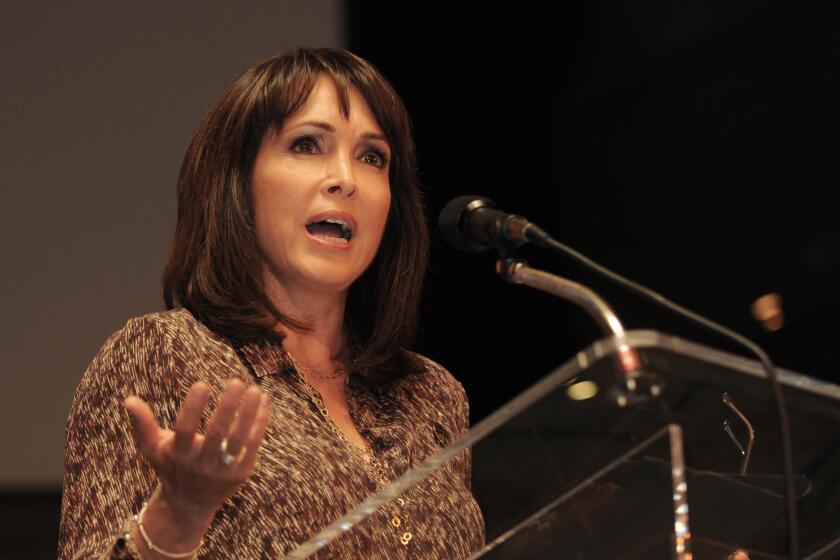TV AND THE GULF WAR : Is It TV’s Obligation to Make War Seem ‘Tasteful?’ : Media: The increasing entertainment values in television news are coming home to roost.
- Share via
It’s no wonder that polls show Americans strongly support military restrictions of the media in the Gulf War.
Patriotism and national security are prime factors. But there’s also this:
Television is the public’s primary source of news images, including local TV, where comical weather reporters and sportscasters, lightweight anchors and ratings sweeps series--such as a recent one on aphrodisiacs--hardly inspire confidence.
Given this trivialization of the news, isn’t it logical that TV viewers would gravitate to well-versed, authoritative military spokesmen who clearly have prepared for media combat in this first instant satellite war?
This can be dangerous, of course--Big Brother. And polls also show that the public thinks the press, overall, is doing a good job.
But the increasing entertainment values in news--from local TV to reality spinoffs such as the tabloid shows “Hard Copy” and “A Current Affair,” not to mention their supermarket kin--are coming home to roost.
The excesses of such aberrations as airhead happy-talk news simply are not going to add to believability. Upbeat war features, sure. But credibility, no.
One is reminded of the film “Network” when a character tells a TV executive: “War, murder, death are all the same to you as bottles of beer.”
But public confidence in TV seemed sky-high at the start of the war when CNN’s Bernard Shaw, Peter Arnett and John Holliman became America’s sweethearts as they broadcast historic reports on the outbreak of hostilities from a Baghdad hotel room.
The fact that restrictions then became the big media story is a pity because, as the war threatened to get uglier on TV with ground action, it became clear that attempts to withhold the ugliness from home viewers were part and parcel of policy.
Is this right?
Maybe, if you’re running the show and have government interests as first priority. But should the networks engage in complicity, which is what they are doing in agreeing that viewers should not see the extreme horrors of war?
Walter Porges, vice president of news practices for ABC, says that “the executive producers of each broadcast” decide on the content and generally “put on only what they’d like to see in their living rooms.”
David Miller, director of foreign news for NBC, adds: “We have our standards of taste. We don’t want to offend the viewer. We’re not grotesque. We maintain prudent standards.”
This is all in keeping with standard network practice. But it may strike some as unique that TV would want to present the most distasteful act of all--war----in a relatively tasteful manner so that it is acceptable in people’s living rooms.
Ed Turner, CNN vice president of news-gathering, says: “You’ve got to have a proper amount of video that reflects an honest record of what occurred. You can’t be dishonest. You have got to show that people get killed and that it isn’t innocent.”
And in a CBS interview before he was reported missing, correspondent Bob Simon said: “There is a rule now that we cannot show a soldier who is in severe agony or shock. We hope we don’t have to film that.” But, he added, it “will be part of the war.”
Viewers, however, apparently are satisfied with the war on TV as it’s being presented.
At another time, in another war, the saying was, “Loose lips sink ships.” Now, everybody has loose lips, and what they say is transmitted around the world instantly. And the public is behind the new TV-war restrictions.
Perhaps, however, only so long as we win easily.
But thus far, the government has shown plenty of moxie in finding persuasive spokesmen--such as its man in Riyadh, Saudi Arabia, Marine Brig. Gen. Richard I. Neal, a homey fellow bound to engender public confidence.
Nonetheless, the hard images of war pop up on TV in unlikely places. On Tuesday night, in a CNN feature about “warriors of yesterday,” a World War II veteran recalled turning to his friend during combat and “suddenly, half his head disappeared.”
TV commentator Linda Ellerbee, discussing the subtle interaction of TV and politics, once said: “We are all raised to believe that the camera doesn’t lie, when in fact nothing lies so easily as a camera. Every time you point a camera at something, you’re pointing it away from something.”
The truth, of course, is neutral. But not in a war. Especially a popular one.
More to Read
The complete guide to home viewing
Get Screen Gab for everything about the TV shows and streaming movies everyone’s talking about.
You may occasionally receive promotional content from the Los Angeles Times.






